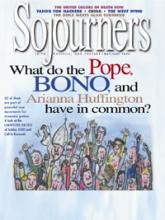You’d have to go back a long way to find this much church unity—maybe not to the first Pentecost, but a long way, to be sure. Churches in this country, it seems, have been known more for what has divided them than for what brings them together.
But there’s evidence that’s changing. Christian leaders representing 60 Catholic, evangelical, mainline Protestant, and African-American churches—along with major church-based organizations—gathered on the East steps of the U.S. Capitol in February around a commitment and promise: ending poverty in America.
With the launch of Call to Renewal’s Covenant and Campaign to Overcome Poverty, American church leaders are saying that poverty is no longer a bipartisan political tool but a top-priority nonpartisan issue. "The story today is very simple," observed Sojourners editor Jim Wallis, convener of Call to Renewal. "In a time of record prosperity, the poor are being left behind, but the churches are being drawn together. Today we are launching a Covenant that can change our lives and a Campaign that can change this country."
The Covenant begins with a confession: "The persistence of widespread poverty in our midst is morally unacceptable. Just as some of our religious forebears decided to no longer accept slavery or segregation, we decide to no longer accept poverty and its disproportionate impact on people of color."
Joining Wallis on the Capitol steps were John Carr, representing the U.S. Catholic Conference; Rich Cizik, of the National Association of Evangelicals; syndicated columnist Arianna Huffington; Rev. Wallace Charles Smith, representing the Progressive National Baptist Convention; Rev. Bob Edgar, general secretary of the National Council of Churches; Sharon Daly, representing Catholic Charities USA; Mark Publow, of World Vision; and David Beckmann, president of Bread for the World.
Read the Full Article
